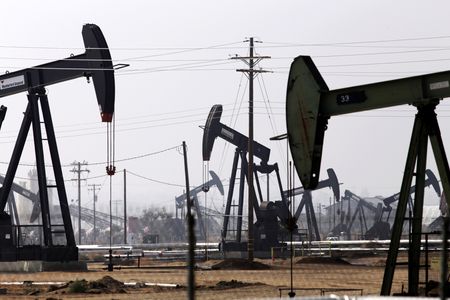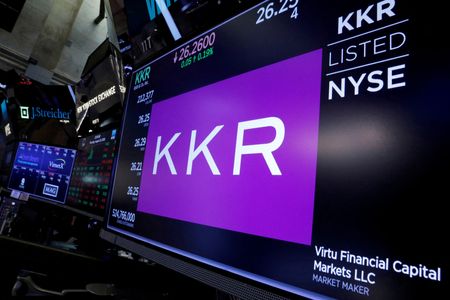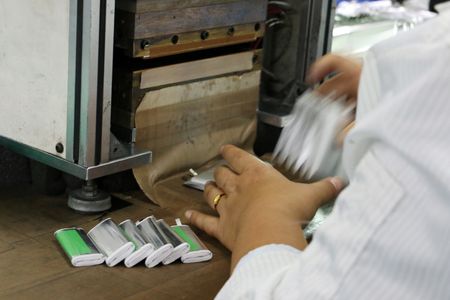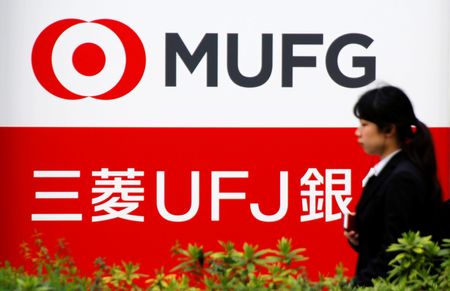By Trevor Hunnicutt and Kevin Huang
WASHINGTON/BEIJING (Reuters) -China on Tuesday imposed targeted tariffs on American imports and put several U.S. companies, including Google, on notice for possible sanctions, in a measured response to the sweeping duties on Chinese imports imposed by President Donald Trump.
Beijing’s limited counter to Trump’s imposition of a 10% tariff on all Chinese imports underscored the attempt by Chinese policymakers to engage Trump in talks that could avert an outright trade war between the world’s two largest economies.
Capital Economics, a U.K.-based research firm, estimated that China’s additional tariffs would apply to about $20 billion of annual imports, compared with the $450 billion worth of Chinese goods subject to the Trump tariff that took effect at 12:01 a.m. ET on Tuesday (0501 GMT).
“The measures are fairly modest, at least relative to US moves, and have been calibrated to send a message to the US,” Julian Evans-Pritchard, the firm’s head of China Economics said in a note.
Trump on Monday suspended his threat of 25% tariffs on Mexico and Canada at the last minute, agreeing to a 30-day pause in return for concessions on border and crime enforcement.
Trump plans to speak to Chinese President Xi Jinping later in the week, a White House spokesperson said.
China’s new measures, announced as the Trump tariff took effect, include a 15% levy on U.S. coal and LNG and 10% for crude oil, farm equipment and a small number of trucks as well as big-engine sedans shipped to China from the United States.
China said it was starting an anti-monopoly investigation into Alphabet Inc’s Google. It put both PVH Corp the holding company for brands including Calvin Klein, and U.S. biotechnology company Illumina on a list for potential sanctions.
EXPORT CONTROLS ON SOME METALS
Separately, China said it was imposing export controls on some metals, including tungsten, that are critical for electronics, military equipment and solar panels.
The 10%-duty China announced on electric trucks imported from the United States could apply to Elon Musk’s Cybertruck, a niche offering Tesla has been promoting in China. Tesla had no immediate comment.
China’s new tariffs will not take effect until Feb. 10, giving Washington and Beijing some time to try and reach a deal that Chinese policymakers have indicated they hope to strike with Trump at a time when China’s domestic demand has been sputtering.
During his first term in 2018, Trump initiated a brutal two-year trade war with China over its massive U.S. trade surplus, with tit-for-tat tariffs on hundreds of billions of dollars worth of goods upending global supply chains and damaging the world economy.
“The trade war is in the early stages so the likelihood of further tariffs is high,” Oxford Economics said in a note as it downgraded its China economic growth forecast.
Trump warned he might increase tariffs on China further unless Beijing stemmed the flow of fentanyl, a deadly opioid, into the United States.
“China hopefully is going to stop sending us fentanyl, and if they’re not, the tariffs are going to go substantially higher,” he said on Monday.
China has called fentanyl America’s problem and said it would challenge the tariffs at the World Trade Organization and take other countermeasures, but also left the door open for talks.
The U.S. is a relatively small source of crude oil for China, accounting for 1.7% of its imports last year, worth about $6 billion. Just over 5% of China’s LNG imports come from the U.S.
Crude prices extended losses to tumble 2% after China’s retaliation, and stocks in Hong Kong pared gains. The dollar strengthened while the Chinese yuan, the euro, the Australian and Canadian dollars, as well as the Mexican peso all fell, reflecting market concerns about the risk of a protracted global trade war. [MKTS/GLOB]
“Unlike Canada and Mexico, it is clearly harder for the U.S. and China to agree on what Trump demands economically and politically. The previous market optimism on a quick deal still looks uncertain,” said Gary Ng, senior economist at Natixis in Hong Kong.
“Even if the two countries can agree on some issues, it is possible to see tariffs being used as a recurrent tool, which can be a key source of market volatility this year.”
NEIGHBOURLY DEALS
There was relief in Ottawa and Mexico City after both Canadian Prime Minister Justin Trudeau and Mexican President Claudia Sheinbaum said they had agreed to bolster border enforcement efforts in response to Trump’s demand to crack down on immigration and drug smuggling. That would pause 25% tariffs due to take effect on Tuesday for 30 days.
Canada agreed to deploy new technology and personnel along its border with the United States and launch cooperative efforts to fight organised crime, fentanyl smuggling and money laundering.
Mexico agreed to reinforce its northern border with 10,000 National Guard members to stem the flow of illegal migration and drugs.
“As President, it is my responsibility to ensure the safety of ALL Americans, and I am doing just that. I am very pleased with this initial outcome,” Trump said on social media.
Canadian industry groups, fearful of disrupted supply chains, welcomed the pause.
“That’s very encouraging news,” said Chris Davison, who heads a trade group of Canadian canola producers. “We have a highly integrated industry that benefits both countries.”
Trump suggested on Sunday the 27-nation European Union would be his next target for tariffs, but did not say when.
EU leaders at an informal summit in Brussels on Monday said Europe would be prepared to fight back if the U.S. imposes tariffs, but also called for reason and negotiation. The U.S. is the EU’s largest trade and investment partner.
(Reporting by David Alire Garcia, Stefanie Eschenbacher and Brendan O’Boyle in Mexico City; Andrea Shalal, Jarrett Renshaw, David Lawder, Trevor Hunnicutt, Nandita Bose, Daphne Psaledakis, Douglas Gillison, Doina Chiacu and Susan Heavey in Washington; David Ljunggren and Promit Mukherjee in Ottawa; Ed White in Winnipeg; Kevin Krolicki and Qiaoyi Li in Beijing; Josephine Mason in London; Bart H. Meijer, Alessandro Parodi, Charlotte Van Campenhout, Andrew Gray, Sudip Kar-Gupta and Geert De Clerq in Europe; Writing by Andy Sullivan and Lincoln Feast; Editing by Rosalba O’Brien, Shri Navaratnam and Sharon Singleton)










